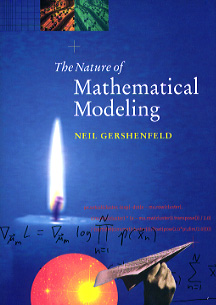
The Nature of Mathematical Modeling
class: Thursdays 1:00-4:00 E14-493
section: Mondays 5:00-6:00 E14-493
Neil Gershenfeld
MAS 864
2020

Digital systems are routinely used to model natural systems for purposes ranging from recognizing realities, to experimenting with possibilities, to realizing fantasies. This course will survey the useful levels of description for such mathematical modeling, including analytical, numerical, and data-driven techniques. The focus will be on understanding how the methods relate, and on how they can be implemented efficiently.
The topics to be covered are:
| Contents | |
| (Linear Algebra) | |
| 2/6: | Introduction, Mathematical Software, Parallel Programming, Benchmarking |
| 2/13: | Ordinary Differential and Difference Equations |
| (Partial Differential Equations) | |
| 2/20: | Random Systems |
| (Variational Principles) | |
| 2/27: | Finite Differences: Ordinary Differential Equations |
| 3/5: | Finite Differences: Partial Differential Equations |
| 3/12: | Finite Elements |
| 3/19: | Discrete Elements, Particles, and Automata |
| 3/26: | Spring Vacation |
| (Computational Geometry) | |
| 4/2: | Function Fitting |
| 4/9: | Search |
| (Control Theory) | |
| 4/16: | Transforms |
| 4/23: | Function Architectures |
| (Linear and Nonlinear Time Series) | |
| 4/30: | Density Estimation |
| (Filtering and State Estimation) | |
| 5/7: | Constrained Optimization |
| (Convex Optimization) | |
| 5/19: | Final Projects |
| Bibliography | |
| Programs |
Relevant background for each of these areas will be covered, with introductory experience in linear algebra, calculus, and programming assumed. The assignments will include problem sets, programming tasks, and a semester modeling project. The course is based on the text The Nature of Mathematical Modeling, with draft revisions for a second edition to be provided throughout the semester.